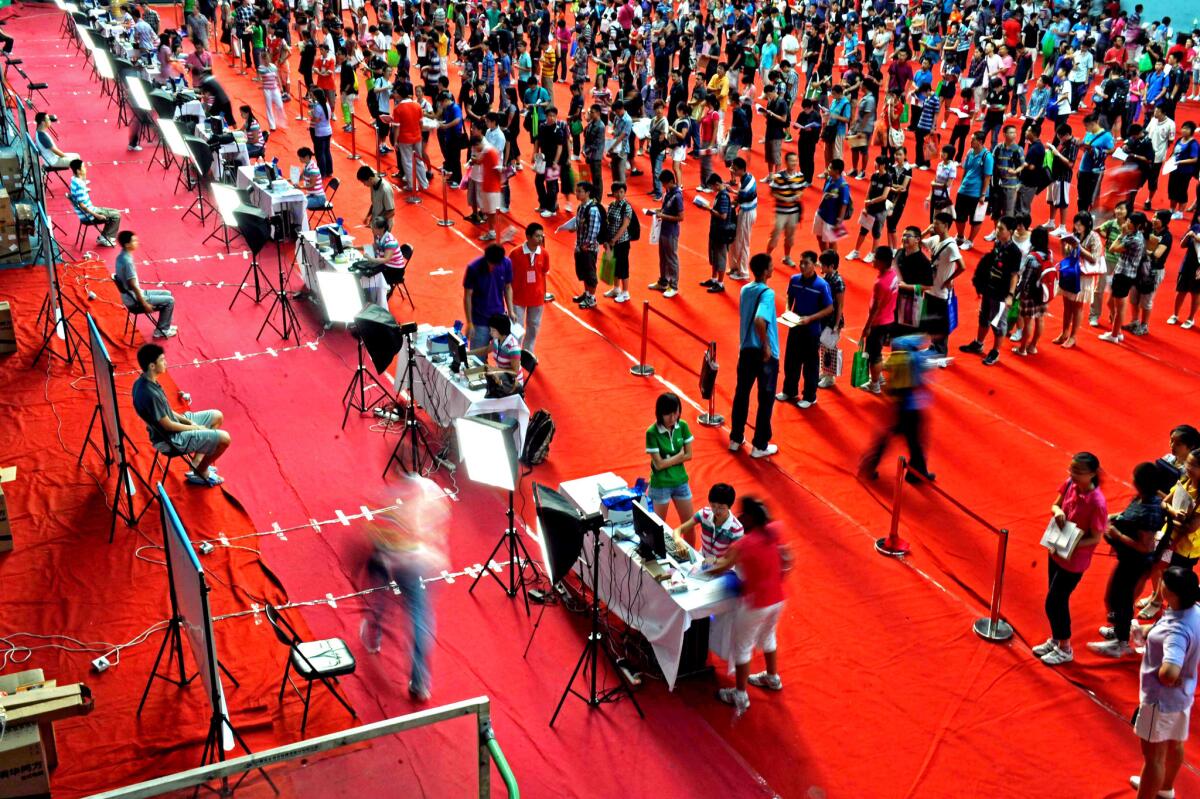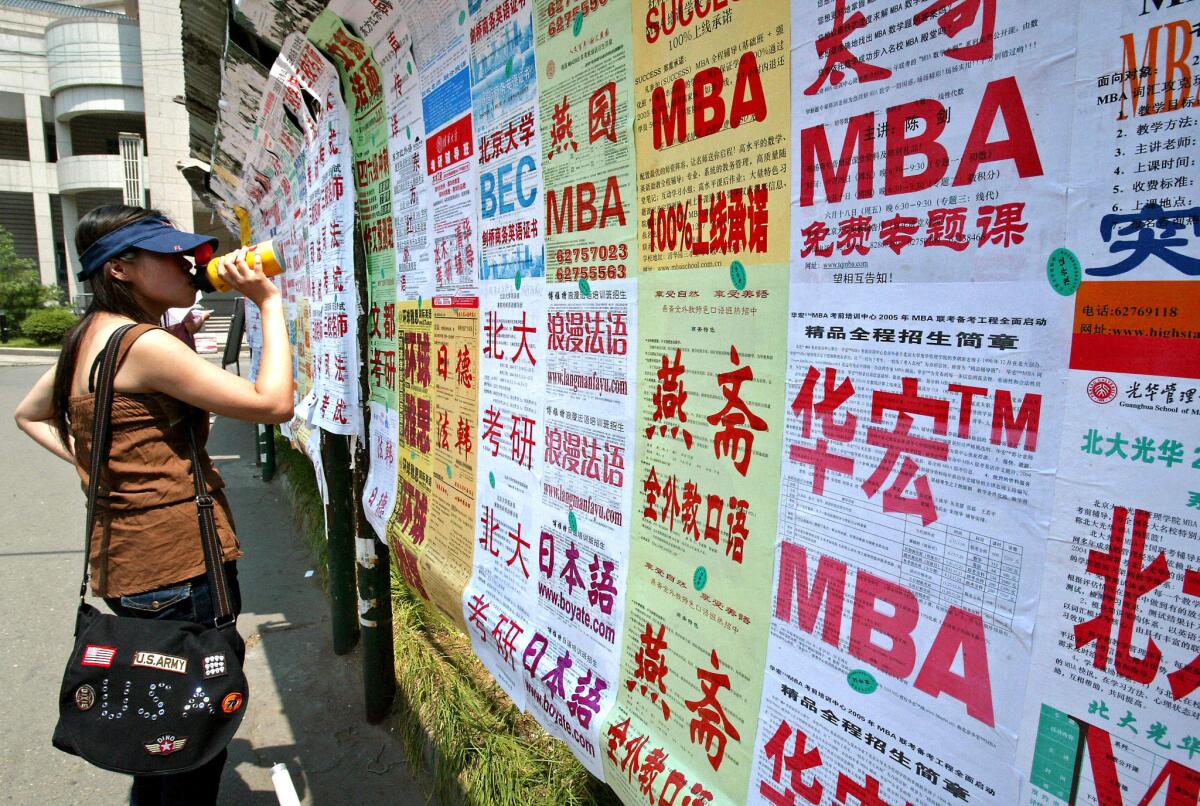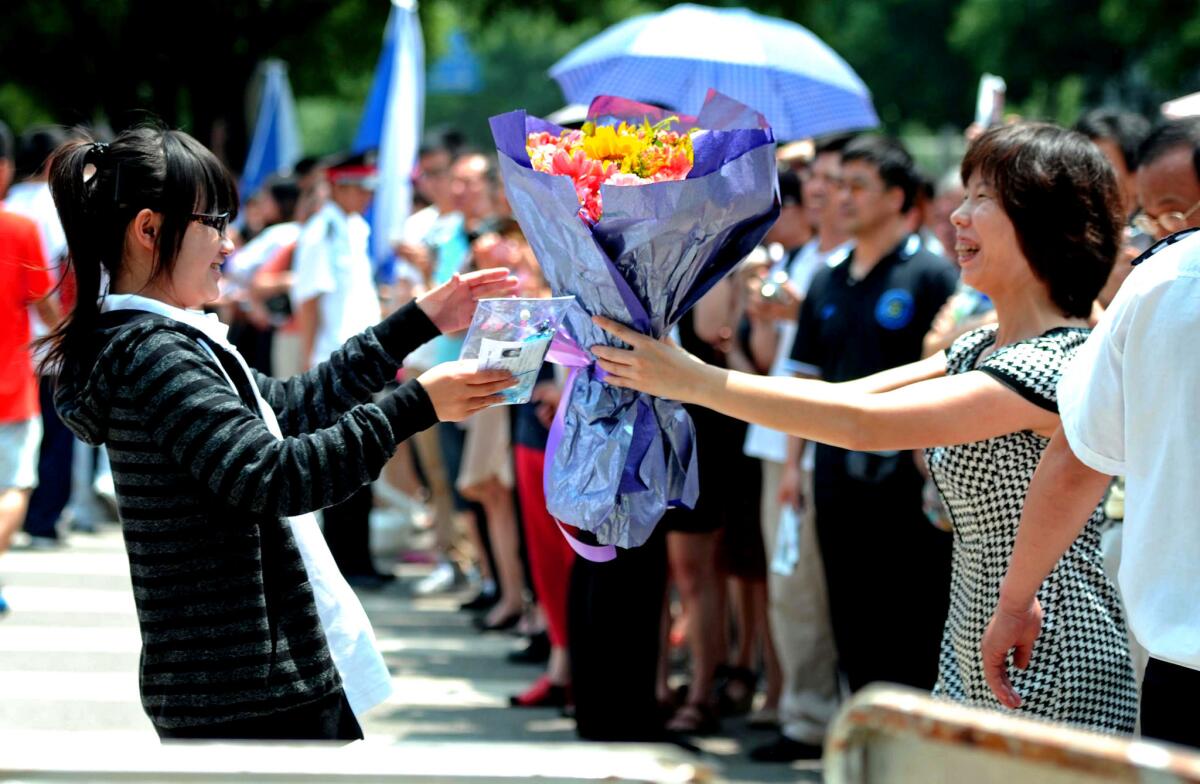Red tape bars students from top China schools
China’s convoluted laws stack the odds against university applicants who lack residency permits for Beijing or Shanghai.
Wang Keyu has lived in the same apartment her entire life. Her bedroom attests to the phases of her childhood: the stuffed animals on the shelves, the kindergarten watercolors and, more recently, the stellar report cards taped to the walls.
But the 13-year-old will soon have to decide whether to leave her hometown and the school that's only a bike ride away and move to a rural province far from her parents and friends.
The reason is that Keyu doesn't have a hukou — or residency permit — for Beijing. Her hukou is for Shandong province, where her parents were born.
No matter that she was born in Beijing, no matter that her parents — both working in information technology — have lived in Beijing for two decades and own their apartment here. Because her parents were born in Shandong province, Keyu is legally registered there.
Although she's been able to attend school in Beijing in return for hefty fees paid by her parents, she is not allowed to take college entrance exams in the capital.
If she wants to go to college, she has to move to Shandong, a place where she knows no one but her septuagenarian grandparents. Her family worries that her education will suffer because the best high schools are in Beijing and students here have as much as a 40-to-1 advantage in getting into a top college.
A tall, athletic girl with hair demurely tucked behind a headband, Keyu has been taught not to complain. But she makes it clear she doesn't want to leave Beijing.
"I love my school," she says, shyly practicing her English. "I have many friends."
Her parents are outraged.
"I grew up in the countryside catching fish in the river with my bare hands. My daughter grew up with field trips to the Forbidden City. She knows nothing of life in the countryside," said Wang Xianli, 40, who lays blame for the gray hairs in his crew cut on anxiety over his only child's education.

First-year students queue up to register at Tsinghua University -- China's equivalent of Yale -- before the start of a new semester. (AFP/Getty Images) More photos
Of all the forms of discrimination in China, educational discrimination is perhaps the most pervasive. It is a legacy of the communist country's planned economy in the 1950s that assigned the entire population hukous that stated where citizens were entitled to receive social benefits such as healthcare and education.
Beijing and to a lesser extent Shanghai were designated as the nation's intellectual centers, housing the top universities and the students deemed most deserving of higher education.
Beijing, for example, has 26 fully accredited universities that give preferential admission to 14 million registered residents with Beijing hukous. (Eight million more residents in the capital city do not have Beijing hukous.)
Populous Henan province in central China has only one university for a population of more than 90 million.
"We used to have quotas for oil, for rice, for wheat. We have gradually lifted all those other quotas, but not for education," said Zhang Qianfan, a law professor at Peking University. "People in Beijing and Shanghai realize this is a very important privilege and they won't give it up so easily."
I grew up in the countryside catching fish in the river with my bare hands. My daughter grew up with field trips to the Forbidden City. She knows nothing of life in the countryside."— Wang Xianli
Chinese universities allocate slots for top scorers from each part of the country on the gaokao, literally the "high test." The exam is widely lauded as the guardian of China's meritocracy and is believed to be relatively free of corruption. Yet the system is stacked against people from the provinces.
Last year, Peking and Tsinghua universities — the Harvard and Yale of China, respectively — allocated 661 spots for Beijing students, and 287 from Shandong, even though there were 71/2 times more test takers from Shandong.
That meant an applicant from Beijing was 18 times more likely to get in than a Shandong applicant, according to statistics published in state media. The odds can be more than double that in favor of students from Beijing when it comes to those from other populous provinces such as Anhui and Henan.
"I don't believe that these students have higher IQs than that of students from the countryside," Michael Yu, a prominent Chinese educator, told the Science and Technology Daily News in March.
For years the leadership has promised to level the playing field for all students as part of an overhaul of the hukou system. Premier Li Keqiang and his predecessor have touched on the gap between rural and urban residents in nearly every major speech on domestic policy.
Wang, Keyu's father, says he has lost hope that the system will be reformed in time to benefit his daughter.

A student at Beijing's prestigious Peking University stops to read ads promoting further educational and career opportunities. (Frederic J. Brown / AFP/Getty Images) More photos
"They've been talking about changing this for 20 years, but it stays the same," Wang said. He believes the resistance comes from policymakers who live in Beijing whose children enjoy easier entry to universities. "The top officials don't want to invite ordinary people to share the privileges of their class."
It is not a small problem. In Beijing's elementary and middle schools, 41% of the students, 419,000 in all, do not have Beijing hukous, according to the municipal education commission.
Millions of students from the provinces face discrimination, but it is the parents of those living in the big cities who are most vocal. These activists don't fit the stereotype of migrant workers; most are university educated and own homes and cars.
"We were encouraged during China's reform and opening by Deng Xiaoping to move from our villages to the city to contribute to the development of the country," said Han Guilin, sales manager of an energy company in Beijing, who moved from Sichuan province in the 1990s.
Now, her 15-year-old son, Jingjing, (whose name was chosen to honor his birth in Beijing) must return to Sichuan, more than 1,000 miles away, to prepare for college.
"My son is really traumatized. He doesn't understand the Sichuan dialect. He wants to stay in Beijing," Han said. During a recent test in his high school, she said, he abruptly put down his pen and refused to write, turning in a blank paper.
"He said what's the point in my studying if I have no future here?"
High school in China is essentially preparation for taking the gaokao, and students who are not university-bound usually drop out or switch to vocational schools. The gaokao varies between localities so practically speaking, a student has to attend high school in the test location to prepare accordingly.
Families are also reluctant to send their children to rural provinces because construction standards are lax. More than 5,000 children were killed in schools that collapsed during the 2008 earthquake in Sichuan.

A happy mother greets a daughter who has finished the first day of the tough college entrance exams in Beijing. (AFP/Getty Images) More photos
"You have schools where the students have to bring their own chairs and desks," said Hu Yang, a mother and activist.
In Beijing, parents of students without Beijing hukous have to pay to enroll their children, usually about $3,000 a year. Their names are placed at the bottom of school registers and they are ineligible for some programs and awards.
"The teachers take better care of the Beijing kids," said Liu Yujun, 15, whose parents moved to Beijing from Shanghai when she was 6.
Wang Xianli wants his daughter to stay in China, so he has decided that either he or his wife will move to Shandong province with Keyu for high school.
"My wife and I will be separated for three years. One of us will quit our job, give up career and friends. It is like we will go back to zero and start from scratch," Wang said. Referring to President Xi Jinping's slogan about the people partaking of what he calls the Chinese dream, Wang added, "Our Chinese dream has become a nightmare."
Those with money and connections often solve the problem by leaving China. Some high schools here place students without Beijing hukous on a special international track offering additional courses in English and French with the assumption that they will attend college abroad.
One student whose family moved from Hainan to Beijing when she was in junior high found that she wasn't able to take the gaokao in Beijing, and was excluded as well from Hainan because she hadn't attended high school there.
Her solution? She took the SATs instead and ended up going to Yale.
Nicole Liu of The Times' Beijing bureau contributed to this report.
Follow Barbara Demick (@BarbaraDemick) on Twitter
Follow @latgreatreads (@latgreatreads) on Twitter
More great reads
Mother waits in vain to hear from detained son in Syria
When you first fall into the hands of the security forces ... you know you can die in any way."
Sign up for Essential California
The most important California stories and recommendations in your inbox every morning.
You may occasionally receive promotional content from the Los Angeles Times.








